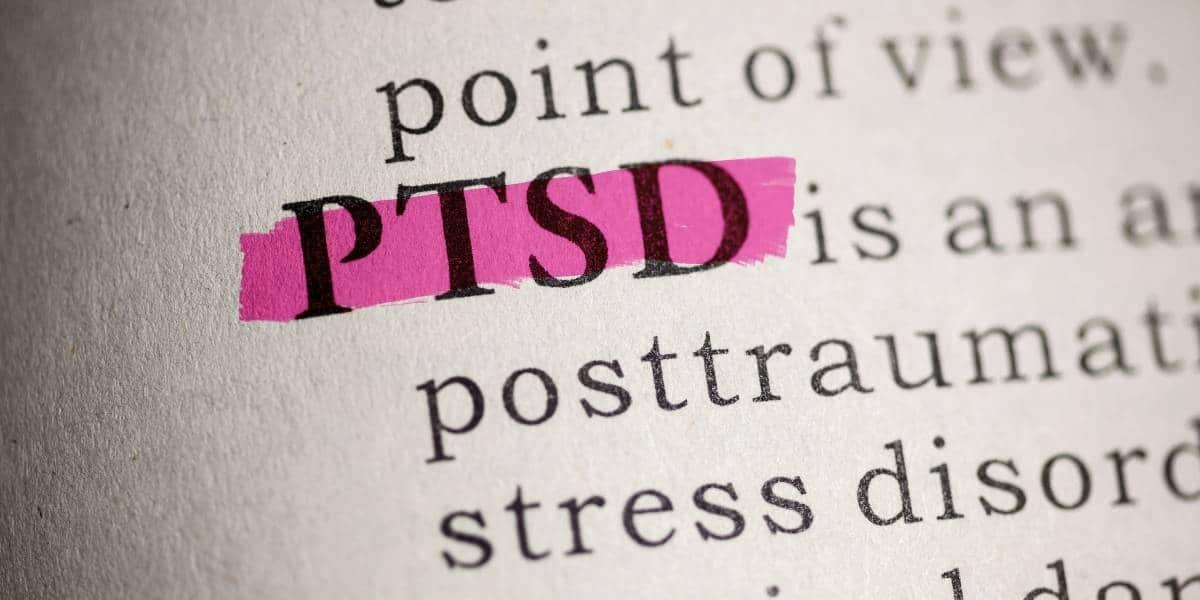We all know what the “fight or flight” response feels like. We know what it feels like to be on alert. And, we know what it feels like to have bad memories. However, with most of us, those feeling are fleeting. They are there in isolated moments then fade away. But, imagine if they didn’t go away. Today, we’ll learn all about PTSD and whether omega-3 can help with PTSD.
Table of Contents
What’s PTSD?
What if you always felt stuck in “fight or flight” mode, were always on alert, and always plagued by a particularly bad memory? What would that be like? For people suffering from post-traumatic stress disorder, that ‘what if’ is their reality.
Post-traumatic stress disorder (PTSD) is relatively common. While it is mostly associated with the psychological aftermath of combat or certain types of assault, it can develop in the wake of any traumatic experience, including accidents and severe bouts of illnesses.
PTSD Symptoms
PTSD typically develops within the first three months after the traumatic incident and it has a wide range of symptoms. The most common symptoms are the constant feelings of fear, helplessness, and of being in danger. Memory is also heavily affected.
Many people with PTSD either have a memory block on parts of the incident and can’t remember certain things or they have vivid flashbacks that can be triggered by anything associated with the incident. Many sufferers also report bouts of paranoia, insomnia, and heightened irritability and aggression.
How does PTSD happen?
The ‘why’ of PTSD is fairly straightforward but the ‘how’ is a little more complicated.
So, the brain is extremely flexible. It has a trait called plasticity that allows it to change and adapt. This trait is generally a good thing and is vital when it comes to brain healing from physical injury. Yet, there are a few cases where brain plasticity can be harmful.
Traumatic events and stress can trigger changes within the brain, and this is what happens when PTSD develops. PTSD is the result of the brain getting rewired – the interactions and the mechanisms of neurotransmission are altered.
There are two parts of the brain that are most heavily affected by trauma: the hippocampus and the amygdala.
The hippocampus is the part of the brain that is responsible for creating new memories. It also plays a role in retaining memories, learning, and handling stress.
The amygdala is where the feelings of fear, awareness, and confusion are produced. It is also associated with triggering temporary amnesia and affecting aggression.
Both the hippocampus and the amygdala interact with the prefrontal cortex, which controls the expression of emotions and impulses, the ability to focus, and the storage of memories.

Omega-3, PTSD, and the brain
Omega-3 fatty acids are important for brain health and repair. That makes it useful at treating the symptoms of most conditions involving brain function and that holds true with PTSD as well. While the trauma of an event can change the brain, that change is not always permanent and can be changed to function normally again.
Diet is one of the factors that can help change the brain and keep it maintaining its proper function. Recent studies into the effects of omega-3 on the development of PTSD have shown that these types of fatty acids not only have a preventive effect, but may also help reverse the trauma-induced changes.
There are people who may be more prone to developing PTSD after a traumatic event. It is believed that those with smaller amounts of grey matter in the hippocampus and the amygdala have a greater risk for experiencing PTSD symptoms. However, it is not known for sure if the decreased grey matter was a pre-existing situation or if the response to trauma and stress lead to those parts of the brain shrinking. The thing that is known for sure is that the hippocampus and the amygdala are significantly smaller in those with the disorder.
Omega-3 has been shown to boost hippocampal neurogenesis. Neurogenesis is the process of new neurons being created, so boosting neurogenesis in the hippocampus leads to more grey matter in that area of the brain.
One study showed this effect when ER patients were started on a regiment of omega-3 supplement directly after being involved with a traumatic accident. The study resulted in a significantly decreased risk of developing PTSD in the months following the accident. The boost in neurogenesis was observed, showing the omega-3 not only helped create new neurons in the hippocampus but also promoted their maturation. A similar effect within the amygdala was noted as well.
Omega-3’s calming effect
After the 2011 earthquake in Japan, a study involving workers from the medical team that had witnessed the traumatic events was conducted. The workers were given omega-3 fish oil and the boost of hippocampal neurogenesis was observed again. However, a second benefit of omega-3 was also shown…
The hippocampus can be damaged by a stress hormone called a glucocorticoid (e.g Cortisol). This hormone is released in response to stress, including the stress of a traumatic event. It affects the transmission of glutamate, a neurotransmitter that plays a large role in memory, learning, and cognitive abilities.
Since the hippocampus is abundant in glutamate receptors, it’s highly susceptible to getting overloaded when there is a large or chronic release of glucocorticoid. The study showed that omega-3 counteracted the glutamate transmission by suppressing the release of glucocorticoid. This protects the hippocampus from becoming damaged by stress or undergoing the changes that can lead to the development of PTSD.
Omega-3 may also be helpful at lessening a few of the symptoms associated with already developed cases of PTSD. Those with PTSD have reported experiencing bouts of depression and omega-3 has been shown to lessen the severity of depression in multiple studies.
Heightened aggression is another symptom of PTSD that omega-3 fatty acids may help alleviate. The amygdala has a central role in the expression of aggression and when the neurotransmitter circuit is altered, either by injury or in response to stress, it can result in feelings of irritability and aggression. Omega-3 appears to protect that circuit and is believed to have a calming effect.
Conclusion on Omega-3 and PTSD
PTSD is common but it’s not thoroughly understood yet. Only a few decades ago, it was considered a social ailment, but we now know that it is a physical condition that is controlled by biological and chemical processes. With omega-3 being so important to brain health, it’s a logical step to consider these fatty acids as a tool to help repair brain function. In combination with therapy and standard treatments, omega-3 can help get the brain back on track and promote recovery from a traumatic event.
💬 Something on your mind? Share your thoughts in the comments. We love hearing from curious minds.
📩 And while you’re here, join our newsletter for more smart stuff (and secret perks)!
References:
1) “1511 The Limbic Lobe” by OpenStax College – Anatomy & Physiology, Connexions Web site. http://cnx.org/content/col11496/1.6/, Jun 19, 2013.. Licensed under CC BY 3.0 via Commons – https://commons.wikimedia.org/wiki/File:1511_The_Limbic_Lobe.jpg#/media/File:1511_The_Limbic_Lobe.jpg
2) Bazan, N., Musto, A., & Knott, E. (2011). Endogenous Signaling by Omega-3 Docosahexaenoic Acid-derived Mediators Sustains Homeostatic Synaptic and Circuitry Integrity. Molecular Neurobiology, 44(2), 216-222. doi:10.1007/s12035-011-8200-6
3) Bremner, J., Elzinga, B., Schmahl, C., & Vermetten, E. (2008). Structural and functional plasticity of the human brain in posttraumatic stress disorder. Progress in Brain Research Stress Hormones and Post Traumatic Stress Disorder Basic Studies and Clinical Perspectives, 167, 171-186. Retrieved September 17, 2015, from http://www.ncbi.nlm.nih.gov/pubmed/18037014
4) Gilbertson, M., Shenton, M., Ciszewski, A., Kasai, K., Lasko, N., Orr, S., & Pitman, R. (2002). Smaller hippocampal volume predicts pathologic vulnerability to psychological trauma. Nature Neuroscience , 5, 1242-1247. doi:10.1038/nn958
5) Koenigs, M., & Grafman, J. (2009). Posttraumatic Stress Disorder: The Role of Medial Prefrontal Cortex and Amygdala. The Neuroscientist, 15(5), 540-548. doi:10.1177/1073858409333072
6) Matsuoka, Y., Nishi, D., Nakaya, N., Sone, T., Hamazaki, K., Hamazaki, T., & Koido, Y. (2011). Attenuating posttraumatic distress with omega-3 polyunsaturated fatty acids among disaster medical assistance team members after the Great East Japan Earthquake: The APOP randomized controlled trial. BMC Psychiatry, 11(132). doi:10.1186/1471-244X-11-132
7) Matsuoka, Y. (2011). Clearance of fear memory from the hippocampus through neurogenesis by omega-3 fatty acids: A novel preventive strategy for posttraumatic stress disorder? BioPsychoSocial Medicine, 5(3). doi:10.1186/1751-0759-5-3
8) Morey, R., Gold, A., Labar, K., Beall, S., Brown, V., Haswell, C., . . . Workgroup, F. (2012). Amygdala Volume Changes in Posttraumatic Stress Disorder in a Large Case-Controlled Veterans Group. Arch Gen Psychiatry Archives of General Psychiatry, 69(11), 1169-1169. doi:10.1001/archgenpsychiatry.2012.50.
9) Popoli, M., Yan, Z., Mcewen, B., & Sanacora, G. (2011). The stressed synapse: The impact of stress and glucocorticoids on glutamate transmission. Nature Reviews Neuroscience Nat Rev Neurosci, 13(1), 22-37. doi:10.1038/nrn3138
10) Woon, F., Sood, S., & Hedges, D. (2010). Hippocampal volume deficits associated with exposure to psychological trauma and posttraumatic stress disorder in adults: A meta-analysis. Progress in Neuro-Psychopharmacology and Biological Psychiatry, 34(7), 1181-1188. doi:10.1016/j.pnpbp.2010.06.016





